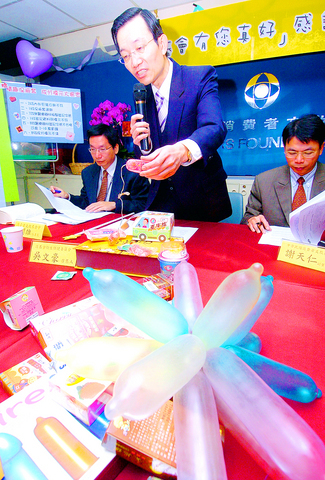As much as 88 percent of condoms sold in adult erotic stores have not passed inspections by the health authorities, according to the results of a survey released yesterday by the Consumers' Foundation ahead of Valentine's Day.
The foundation examined 25 condom brands purchased from 11 stores in Taipei City and Taipei County on Feb. 3 and Feb. 4.
While all brands of condoms sold on the market are required to be registered with the Department of Health as a medical product and to display a license code on their packaging, the survey found that 18 of the surveyed products did not carry a license code and four others carried codes that did not belong to their brands.

PHOTO: SUNG CHIH-HSIUNG, TAIPEI TIMES
Only two types of condoms were labeled with all the information required by the Pharmaceutical Affairs Law (
The labeling of six condom packages was inconsistent in terms of the manufacturing and expiration dates given on their inner and outer packaging, while four others were past their expiration dates, the foundation found.
Among the 18 condoms with fragrances that were sampled, 12, or 67 percent, either did not indicate their ingredients at all or did not clearly label their ingredients, the survey said.
The chairman of the Consumers' Foundation, Cheng Jen-hung (程仁宏), urged the Department of Health to step up its inspection of condoms and to fine those manufacturers who fail to comply with the regulations.

Taiwan is stepping up plans to create self-sufficient supply chains for combat drones and increase foreign orders from the US to counter China’s numerical superiority, a defense official said on Saturday. Commenting on condition of anonymity, the official said the nation’s armed forces are in agreement with US Admiral Samuel Paparo’s assessment that Taiwan’s military must be prepared to turn the nation’s waters into a “hellscape” for the Chinese People’s Liberation Army (PLA). Paparo, the commander of the US Indo-Pacific Command, reiterated the concept during a Congressional hearing in Washington on Wednesday. He first coined the term in a security conference last

A magnitude 4.3 earthquake struck eastern Taiwan's Hualien County at 8:31am today, according to the Central Weather Administration (CWA). The epicenter of the temblor was located in Hualien County, about 70.3 kilometers south southwest of Hualien County Hall, at a depth of 23.2km, according to the administration. There were no immediate reports of damage resulting from the quake. The earthquake's intensity, which gauges the actual effect of a temblor, was highest in Taitung County, where it measured 3 on Taiwan's 7-tier intensity scale. The quake also measured an intensity of 2 in Hualien and Nantou counties, the CWA said.

The Overseas Community Affairs Council (OCAC) yesterday announced a fundraising campaign to support survivors of the magnitude 7.7 earthquake that struck Myanmar on March 28, with two prayer events scheduled in Taipei and Taichung later this week. “While initial rescue operations have concluded [in Myanmar], many survivors are now facing increasingly difficult living conditions,” OCAC Minister Hsu Chia-ching (徐佳青) told a news conference in Taipei. The fundraising campaign, which runs through May 31, is focused on supporting the reconstruction of damaged overseas compatriot schools, assisting students from Myanmar in Taiwan, and providing essential items, such as drinking water, food and medical supplies,

Prosecutors today declined to say who was questioned regarding alleged forgery on petitions to recall Democratic Progressive Party (DPP) legislators, after Chinese-language media earlier reported that members of the Chinese Nationalist Party (KMT) Youth League were brought in for questioning. The Ministry of Justice Investigation Bureau confirmed that two people had been questioned, but did not disclose any further information about the ongoing investigation. KMT Youth League members Lee Hsiao-liang (李孝亮) and Liu Szu-yin (劉思吟) — who are leading the effort to recall DPP caucus chief executive Rosalia Wu (吳思瑤) and Legislator Wu Pei-yi (吳沛憶) — both posted on Facebook saying: “I